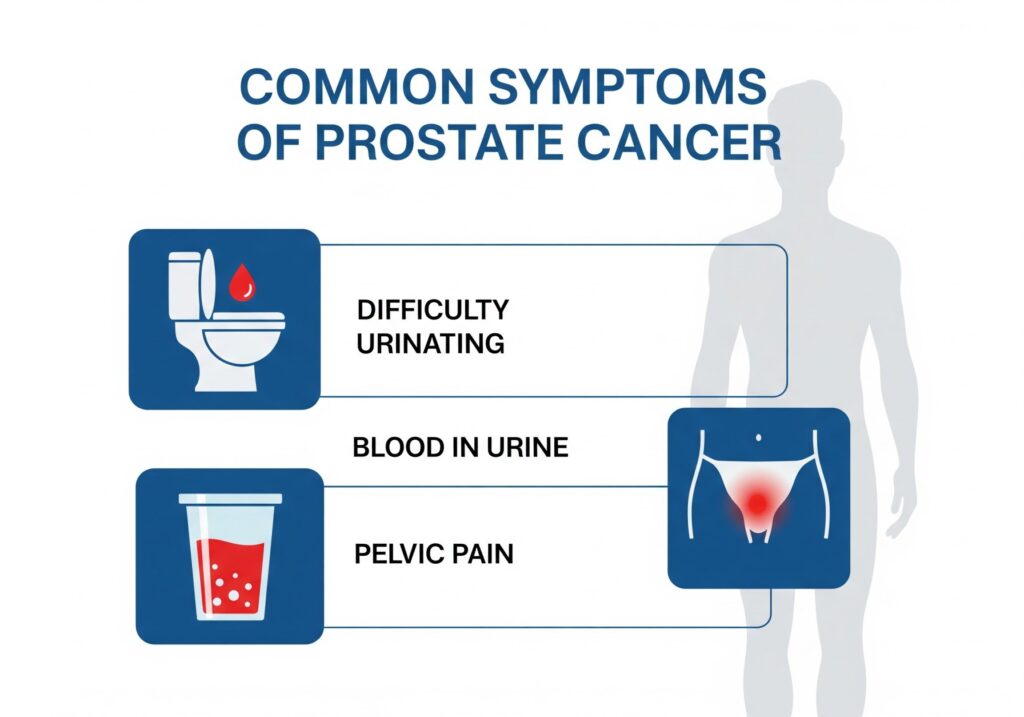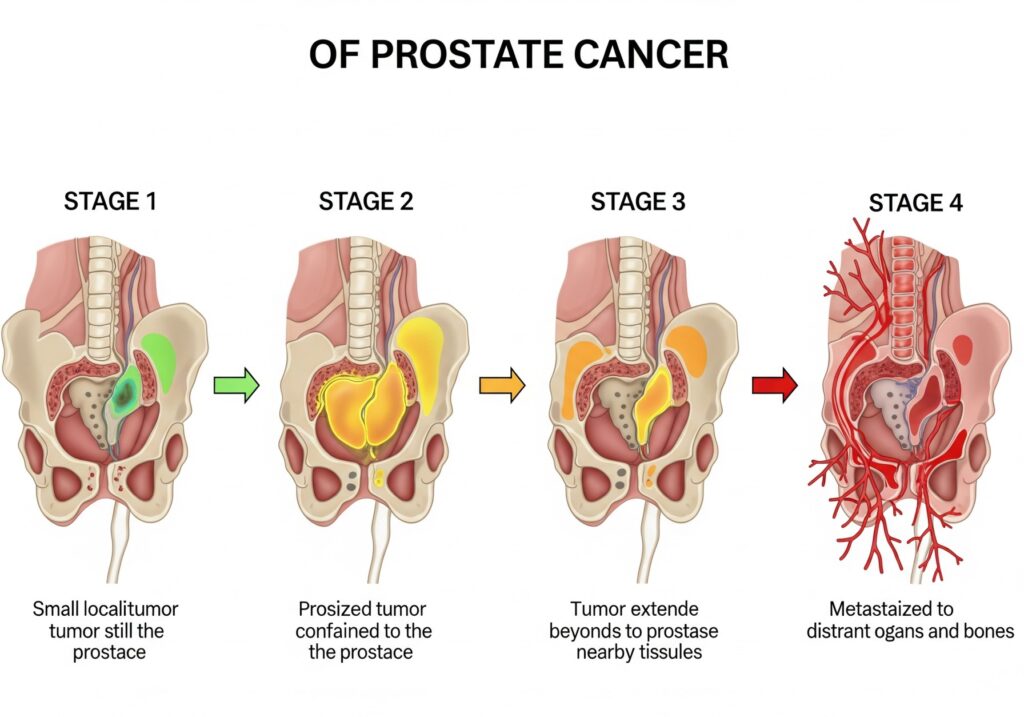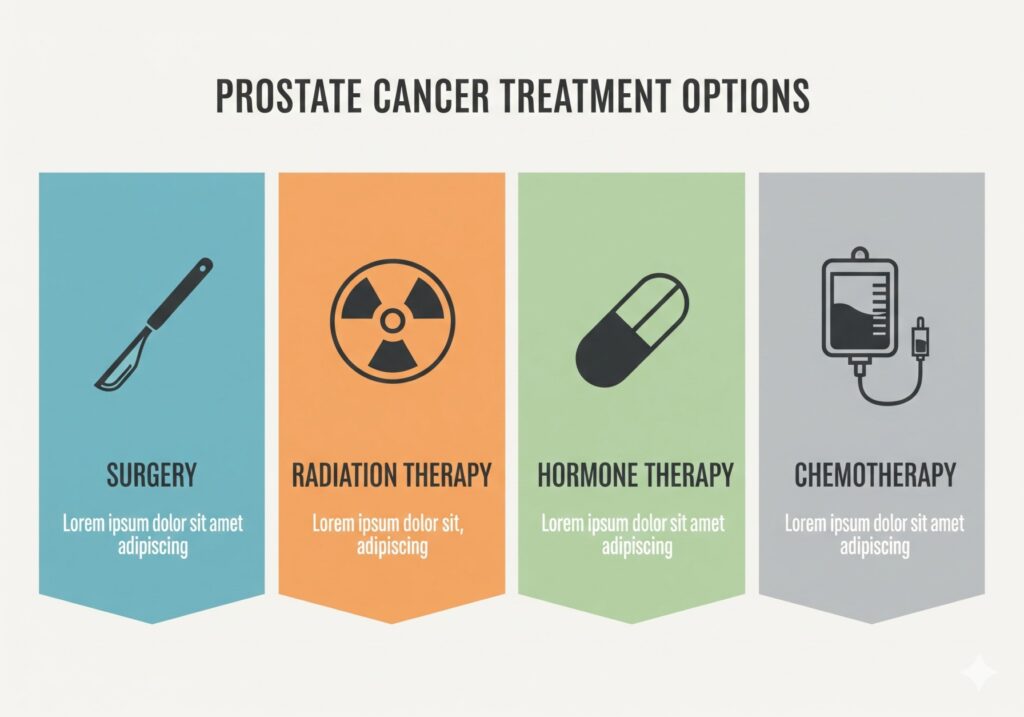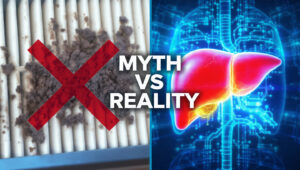
Prostate cancer treatment discussion between doctor and patient
Learn about prostate cancer treatment, symptoms, causes, stages, and tests. A complete guide in simple language with trusted health links.
Prostate Cancer Treatment: Symptoms, Causes & Stages
Prostate cancer is one of the most common cancers in men. The good news is that if detected early, it can often be treated successfully. In this guide, we’ll explore prostate cancer treatment options, its symptoms, causes, stages, and tests. We’ll also answer common questions to make things simple and clear.
What is Prostate Cancer?
The prostate is a small gland below the bladder in men. Its job is to produce fluid that nourishes sperm. Sometimes, cells in the prostate grow out of control. This leads to prostate cancer.
While not all prostate cancers spread quickly, some can be aggressive. That’s why early detection and the right treatment are crucial.
👉 Learn more from the National Cancer Institute.
Common Prostate Cancer Symptoms

Many men with early prostate cancer do not notice any symptoms. However, as the cancer grows, some signs may appear:
- Trouble urinating
- Weak urine flow
- Blood in urine or semen
- Pain in the pelvic area
- Bone pain (in advanced cases)
👉 For a detailed article, check out our guide on early-stage prostate cancer symptoms.
Causes and Risk Factors
Doctors do not know the exact cause of prostate cancer. Still, certain factors may increase risk:
- Age: Risk is higher in men over 50.
- Family history: Having a father or brother with prostate cancer increases the chances.
- Diet and lifestyle: High-fat diet and obesity may raise risk.
- Ethnicity: African-American men face a higher risk.
👉 Mayo Clinic explains prostate cancer risk factors.
Prostate Cancer Staging

Staging helps doctors decide the best treatment. Prostate cancer is divided into stages:
Stage 1:
Cancer is very small and only in the prostate.
Stage 2:
Cancer is larger but still inside the prostate.
Stage 3:
Cancer spreads outside the prostate to nearby tissues.
👉 Read more: Guide on early-stage prostate cancer symptoms.
Stage 4:
Cancer spreads to lymph nodes, bones, or other organs.
Prostate Cancer Tests
Doctors use different tests to confirm prostate cancer:
- PSA Blood Test: Measures prostate-specific antigen in the blood.
- Digital Rectal Exam (DRE): The Doctor checks the prostate physically.
- Biopsy: Small tissue samples are examined for cancer.
- Imaging Tests: MRI, CT scans, or bone scans show if cancer has spread.
👉 American Cancer Society – Prostate Cancer Screening.
Prostate Cancer Treatment Options

Now, let’s explore the main focus: prostate cancer treatment. The choice depends on stage, age, overall health, and patient preference.
1. Active Surveillance (Watchful Waiting)
- For a very slow-growing cancer.
- Doctors closely monitor with regular PSA tests and biopsies.
- Treatment starts only if the cancer begins to grow.
2. Surgery (Prostatectomy)
- Removes the prostate gland.
- Suitable for cancer confined to the prostate.
- Risks include urinary incontinence and erectile dysfunction.
👉 Johns Hopkins on prostatectomy.
3. Radiation Therapy
- High-energy rays kill cancer cells.
- It can be external radiation or internal (brachytherapy).
- Side effects: fatigue, bowel problems.
4. Hormone Therapy (Androgen Deprivation Therapy)
- Prostate cancer cells grow with testosterone.
- This therapy lowers testosterone to slow growth.
- It may be combined with radiation.
5. Chemotherapy
- Drugs kill rapidly growing cells.
- Used in advanced or hormone-resistant cancers.
6. Immunotherapy
- Uses the body’s immune system to fight cancer.
- Example: Sipuleucel-T (Provenge).
7. Targeted Therapy
- Drugs attack specific genetic changes in cancer cells.
- Example: PARP inhibitors for men with BRCA mutations.
Lifestyle and Supportive Care
Besides medical treatment, lifestyle changes can support recovery:
- Eat a healthy diet rich in fruits, vegetables, and whole grains.
- Stay physically active.
- Manage stress through meditation or yoga.
- Join a prostate cancer support group.
👉 Cancer Research UK – Living with Prostate Cancer.
Prevention Tips
While prostate cancer cannot be fully prevented, these steps may lower risk:
- Maintain a healthy weight.
- Exercise regularly.
- Limit red meat and processed foods.
- Get regular checkups if you are over 50 or at high risk.
FAQs on Prostate Cancer Treatment
1. What is the best treatment for prostate cancer?
There is no single “best” treatment. It depends on the stage and overall health. Surgery, radiation, and hormone therapy are common.
2. Can prostate cancer be cured completely?
Yes, if detected early, many men are cured with surgery or radiation.
3. What is the survival rate of prostate cancer?
The 5-year survival rate is nearly 100% for localized prostate cancer, according to the American Cancer Society.
4. Does prostate cancer always need treatment?
Not always. Slow-growing cancers may be managed with active surveillance.
5. What are the side effects of prostate cancer treatment?
Common side effects include fatigue, urinary problems, sexual dysfunction, and bowel issues.
Final Thoughts
Prostate cancer treatment has improved greatly in recent years. With early detection and the right approach, most men live long and healthy lives after treatment. Remember, awareness and regular checkups are the key.
👉 Explore our related guides:
Medical Disclaimer: This article is for educational purposes only and is not a substitute for professional medical advice, diagnosis, or treatment. Always consult a qualified healthcare provider with any questions you may have about your health or before making changes to your diet or lifestyle.
Call to Action: If you found these tips helpful, share this article with friends and family. For more science-backed health insights, explore our latest blogs on Nowspress.






I don’t think the title of your article matches the content lol. Just kidding, mainly because I had some doubts after reading the article. https://accounts.binance.com/register-person?ref=IXBIAFVY
Reading your article helped me a lot and I agree with you. But I still have some doubts, can you clarify for me? I’ll keep an eye out for your answers.